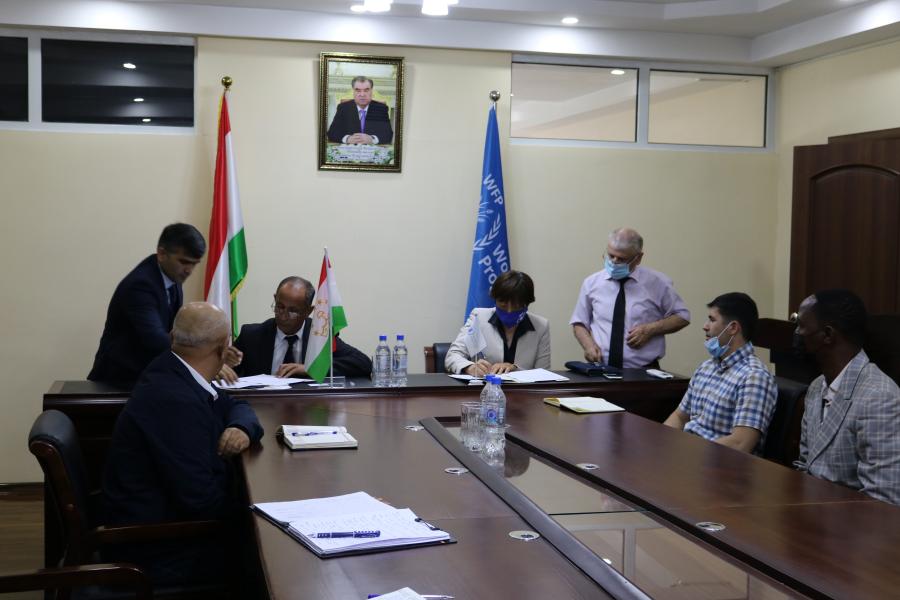WFP and Tajik Government sign MOU on integrated water resources management and climate change adaptation
19 May 2021
DUSHANBE – The United Nations World Food Programme (WFP) and the Agency for Land Reclamation and Irrigation of Tajikistan have signed a memorandum of understanding (MOU) on technical cooperation in integrated water resources management and climate change adaptation.

Within this MOU, WFP and the Agency for Land Reclamation and Irrigation of Tajikistan will strengthen bilateral cooperation, establish and advance the systems, modalities and procedures that will be needed to strengthen integrated water resources management as key component of climate change adaptation.
“WFP will support the Agency for Land Reclamation and Irrigation of Tajikistan in the implementation of its plan for the use of integrated water resources management within the framework of the Water Sector Reforms Programme of the Republic of Tajikistan for 2016-2025 and the National Climate Change Adaptation Strategy,” said WFP Deputy Country Director and Representative, a.i. Mariko Kawabata. “With the joint efforts, we aim to enhance the adaptive capacities of vulnerable households to cope with the adverse effects of climate change”.
The sides will also strengthen technical cooperation for the improvement of an integrated water resources management approach in order to enhance the adaptative capacities of vulnerable households to cope with the adverse effects of climate change.
Through its resilience projects, WFP helps food-insecure households and communities build their common assets to boost their resilience against climate-related shocks. While they are engaged in asset creation projects, such as building and rehabilitating roads, irrigation canals, and water supply systems. Communities receive cash transfers for working on creating community assets such as irrigation systems, soil and water conservation, drinking water supply system and the construction of bridges, roads and other critical infrastructure. These reduce the risk of disaster, strengthen livelihoods, and build climate resilience.
In addition, WFP provides policy advice, technical assistance and capacity and systems strengthening to key public institutions and private sector stakeholders, such as the Committee for Emergency Situations and Civil Defence, the Ministry of Health and Social Protection of the Population, the Ministry of Education and Science, the Chamber of Commerce, and other relevant agencies, in line with SDG 17.
In 2020, within the framework of the COVID-19 response action and through its resilience activity, WFP launched cash-for-work projects to support more than 27,000 beneficiaries in GBAO and the Rasht Valley. WFP prioritized households that were chronically food insecure and directly affected by the socioeconomic shocks, primarily due to market price spikes and reduced income from remittances. Households headed by women were of particular concern. The projects provided 6,700 participants and their families with cash assistance in exchange for their work on rehabilitating or constructing community assets such as irrigation canals, drinking water supply systems, feeder roads, and forestry areas in the targeted communities. Specific activities at the sites ensured the participation of women, despite cultural-sensitivities regarding labour-based works, and people living with physical disabilities who could not work also received assistance.
# # #
The United Nations World Food Programme is the world’s largest humanitarian organization, saving lives in emergencies, building prosperity and supporting a sustainable future for people recovering from conflict, disasters and the impact of climate change.
For more information please contact: nasrullo.ramazonov@wfp.org
Nasrullo Ramazonov, WFP/ Dushanbe, Tel. +992 44 625 20 00, Mob. +992 900 09 29 87

